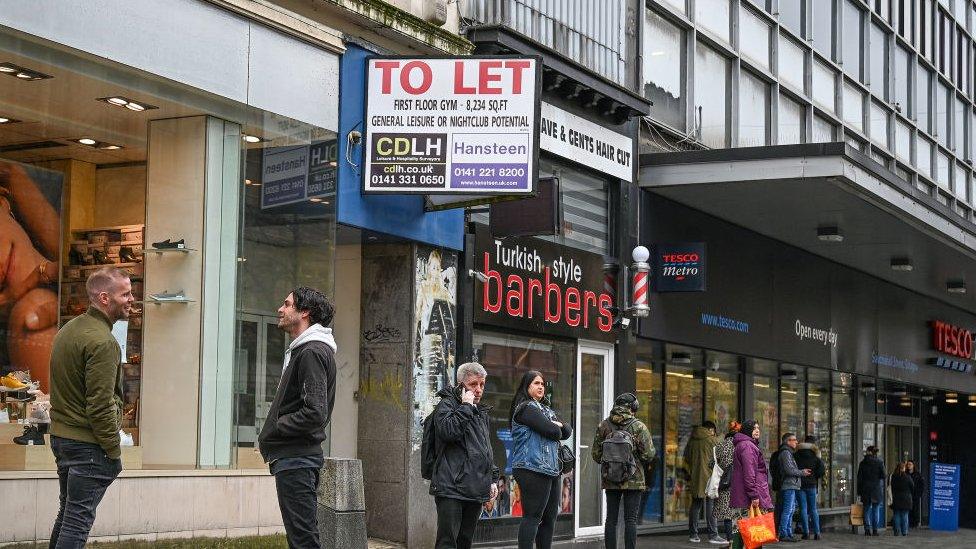Business rates: Government's golden goose
- Published

Business rates rake in nearly £3bn a year in Scotland, but they're widely seen as unfair - and most unfair on those that want to invest.
Calls for reform come frequently, particularly from retailers who compete with online sellers which face much lower tax costs.
But it's become a regular feature of the dialogue between business and government that such pleas are met mainly with polite silence.
Not many people like paying taxes, but most recognise it's their duty to do so, and there is a case for levying them the way they are.
To put a progressive tax on your income and on the stuff you buy is seen as, more or less, fair. To put higher rates of duty on things in which you would be better not to over-indulge - the so-called sin taxes on alcohol, tobacco and gambling - is conceded, sometimes grudgingly.
That consensus is much less strong on council tax - long overdue for a reform, or at least revaluation. The last one was also the first, preserving the tax system in the aspic of 1991. But the idea of reform gathers dust in the "too difficult" filing cabinet for most politicians.
And then there are business rates, or Non-Domestic Rates (NDR). These are the subject of regular loud appeals from those who have to pay them to governments at Westminster and Holyrood, urging fundamental reform.
What kind of pro-growth strategy is it when investment in your office, shop, factory or warehouse - perhaps to improve its energy efficiency or expanding to allow for more recruits - is greeted with a higher tax bill?

City and town centre shops face the burden of business rates which may be far higher than online competitors
And if people want to see their city and town centres flourish, why are we taxing the bricks and mortar retailers when their markets are being rapidly eroded by online sales, "fulfilled" from large warehouses with lower overheads (relative to turnover) and lower business rates bills.
The case for at least a freeze on business rates in the Holyrood budget, to be set out in draft on 15 December, has been made by an unusually wide range of business interests. No fewer than 19 trade bodies, ranging from the CBI and Institute of Directors to the builders, printers, bakers, engineers and cinema operators.
'Inequitable and unfair'
The case for reform has been raised this week again by the Economic and Fair Work Committee at Holyrood, making a strong, if sometimes familiar, case for helping Scotland's town centres.
"It was clear from the business community's evidence and the Scottish Government's own Town Centre Action Plan Review Group that the non-domestic rates system is perceived as inequitable and unfair," the MSPs reported.
"The current NDR system acts as a disincentive when trying to attract businesses back to our town centres. For businesses already located in town centres, the current NDR system acts as a disincentive to invest in already occupied property, as any investment leads to an increase in NDR.
"The committee consistently heard that the current system works against investment and growth in town centre retail and that the NDR system should be rebalanced to support town centre development."

These appeals are generally met with deflection onto minor reforms and, beyond that, by a polite silence from government. Business rates, which also cover lots of non-businesses, are too valuable not to collect. In Scotland, they are forecast to bring in nearly £2.8bn this financial year, rising to £3.3bn next year when a revaluation kicks in.
While other income goes up and down with cycles in the economy or the property market, business rates just keep on giving. They are not related to the financial health of the property's occupants, so they are levied on those making a loss in a downturn just as rateable values are ratcheted up by rising property and rental valuations in the upswings.
There is tinkering with them, around the appeals system and the regularity of revaluations. Those investments to improve buildings do not now lead to an immediate increase in the tax bill. There are reliefs if you install solar panels or run a childcare centre.
The Barclay Review recommended several of these five years ago. But because its remit from Holyrood ministers stated that any reforms had to retain the same level of revenue, the review team ducked the issue of the digital economy's growth.
Dearth of data
There is a substantial rates relief scheme known in Scotland as the Small Business Bonus Scheme. It applies in full to small premises valued at rental of less than £15,000 a year and with reduced level of relief for those up to £18,000. After 14 years, there is an expectation baked in by small firms who benefit by an average of more than £7,000 a year, and by SNP ministers, that it will remain in place.
Does it act as an incentive for small businesses to invest or to expand employment? For a long time, no-one knew. It was regularly pointed out by trade unions, and by the Barclay Review of business rates in 2017, that it might be an idea to find out. After all, the value of that tax relief has risen rapidly, and between 2008 and 2020, it totalled £2.8bn (at 2020 prices).
So the Scottish government commissioned the economists at the Fraser of Allander Institute to find out the effect of the Small Business Bonus Scheme.
The answer came back: we found no evidence to show this scheme works, but nor could we find any evidence that it doesn't, because the available data tell us very little.
As you might expect from economists, who like to count things, the Strathclyde University researchers recommended that the Scottish government introduce a register of businesses, attached to the premises they use, and including figures for investment, employment and turnover.
That could be of added significance if there is to be a reliable measure of turnover as a basis for a different tax regime.
That is seen as a fairer way of taxing business - as with corporation tax, it depends on a firm's financial success and it would follow the peaks and troughs of their trading cycle.
Yet moving away from a fixed source of tax revenue would be hard. This is a time when it is becoming harder to nail down other sources of tax as firms and people with good accountants take their opportunities to avoid paying tax on income and more moveable assets.
Digital commerce is difficult to tax, even though some think the introduction of an online sales tax is overdue. (It's probably become easier since Brexit.)
So a fixed asset, such as a building or land, looks all the more appealing to tax authorities.
For smaller retailers who are at the wrong end of a tax system that benefits the low-overhead online shopping giants, they may do well to note another of that Holyrood committee's report: that they invest their time, effort and money into e-commerce themselves. If you can't beat 'em...
Related topics
- Published15 November 2021

